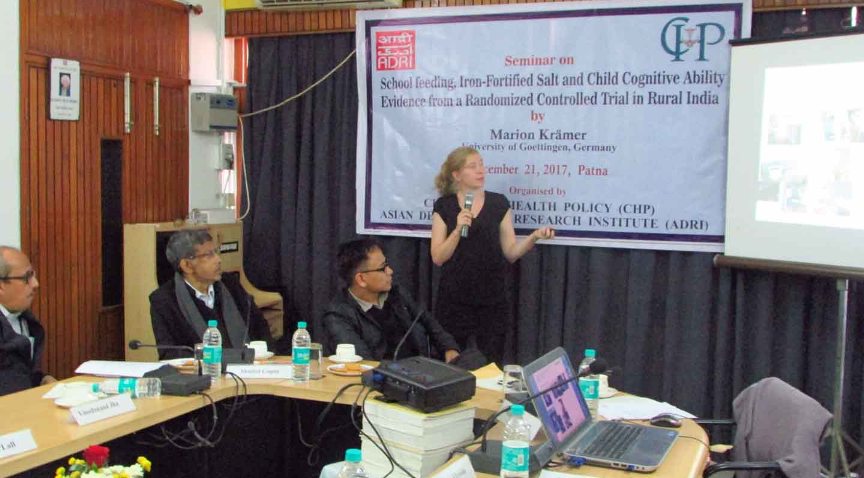Events of CHP

Time - 3 PM to 5 PM
Venue – Seminar Hall, ADRI premises, Patna
Patna, 21 December. Iron deficiency in childhood is known to have long-term irreversible consequences on cognitive development and learning outcomes and hence, productivity later on in life. Iron deficiency is widely spread among Indian children. These are the enunciations of Dr. Marion Kramer, University of Goettingen, Germany while she was delivering a seminar on "School feeding, Iron-Fortified Salt and Child Cognitive Ability : Evidence from a Randomized Controlled Trial in Rural India" today at Centre for Health Policy (CHP) at ADRI.
She presented experimental evidence on the impact of distributing double-fortified salt (DFS), salt fortified with iron and iodine, to children through the innovative channel of the mid-day meal program. As outcomes, she looked at anemia, cognitive ability and learning outcomes of primary-school children. She found that the treatment improved hemoglobin level, but no improved learning outcomes. She further showed that the intervention was very cost-effective..
In his address Chief Guest Mr. R.L. Chongthu, Secretary, Department of Education said that this study is very important for future policy decision. Based on the recommendation of the study, GoB may consider inclusion of DFS in Mid-day meal programme.
Dr. Shaibal Gupta, member secretary provided his valuable feedbacks and Dr. Sunita Lall from ADRI also contributed in discussion
Earlier, Dr Basudeb Guha – Khasnobis, Director, CHP welcomed the guests and introduced the speaker. Dr. Vikash Keshri from CHP contributed in discussion. Dr. Arundhati proposed the vote of thanks.
Concept Note:
Iron deficiency in childhood is known to have long-term irreversible consequences on cognitive development and learning outcomes and hence productivity later in life. Iron deficiency is widely spread among Indian children. We present experimental evidence on the impact of distributing double-fortified salt (DFS), salt fortified with iron and iodine, to Indian children through the innovative channel of the Indian school-feeding program. As outcomes we look at anemia, cognitive ability and learning outcomes of primary-school children. One-year supply of iron-fortified iodized salt was randomized across 107 government-funded schools in a rural area of the Indian state Bihar. We find that the treatment improved hemoglobin level by 0.14 g/dl and reduced the prevalence of any form of anemia by 9.3 and of mild anemia by 6 percentage points. However, the improvement in health did not translate into improved learning outcomes as the effects of DFS on cognitive and learning outcomes are statistically insignificant, which might be explained by the relatively short treatment period of one year. Despite the short treatment period, there is, however, weak evidence that with high school attendance (80 or 90% school attendance) the treatment had a positive effect on reading and math scores. We further find that the intervention is very cost-effective. Our results suggest that using DFS in school-feeding programs can be an effective channel for improving child health, but impacts of cognitive and learning outcomes might need more time to materialize.
Short bio of the presenter:
Dr. Marion Kraemer is a post-doctoral researcher at the University of Göttingen, Germany, working in the research training group “Transformation of Global Agri-Food Systems”. Her research focuses on the link between nutrition and child development, particularly the evaluation of child nutrition interventions in low- and middle-income countries. Dr. Kraemer has extensive experiences in academia, including empirical field research, as well as in the field of practical development cooperation, mostly earned in India but also in several other countries (e,g, Bangladesh, Bolivia, USA).
RSVP and Contact:
Dr. Vikash R Keshri, CHP – vikash.chp@adriindia.org, Ph: 0612-2575649, ext.- 241